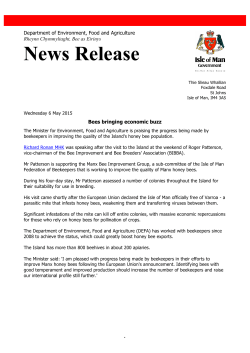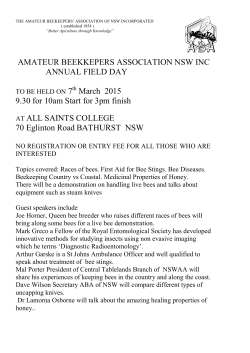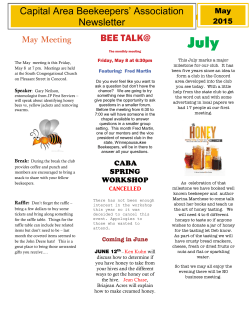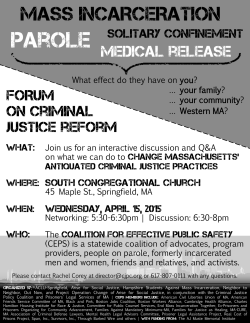
View in PDF format - Honey Bee Health Coalition
CONTACT: Julie Shapiro Keystone Policy Center (970) 513-5830 Honey Bee Health Coalition Ready to Provide Leadership in Implementing National Pollinator Health Strategy Strategy Highlights Coalition as Platform for Public-Private Coordination to Accelerate, Achieve Task Force Goals [Keystone, Colorado, May 19, 2015] – The Honey Bee Health Coalition applauded the announcement of the National Strategy to Promote the Health of Honey Bees and other Pollinators and the accompanying Pollinator Research Action Plan, released today by President Barack Obama’s Pollinator Health Task Force. The Strategy represents a critical step in improving the health of honey bees and other pollinators that support billions of dollars annually in U.S. and Canadian agriculture. The Strategy sets clear goals for pollinator health that underscore the importance of the Honey Bee Health Coalition’s ongoing work. The Honey Bee Health Coalition commends the Task Force for its emphasis on publicprivate partnerships to improve pollinator health and stands ready to provide coordination and leadership. The Strategy specifically cites the Coalition as an example of a public-private partnership and vehicle for collaboration, outreach, and education. “The Strategy released by the National Pollinator Health Task Force underscore the importance of pollinator health for agriculture and the environment,” said George Hansen, a commercial beekeeper, past president of the American Beekeeping Federation, and a member of the Coalition’s Steering Committee. “As one of the largest and most diverse public-private partnerships already working to address honey bee health across agriculture, the Honey Bee Health Coalition is eager and ready to support the implementation of the Strategy. In fact, the Coalition is already working to advance collaborative solutions and is poised to drive commitments and positive impacts on the ground.” Agriculture, healthy lifestyles, and worldwide food security rely on honey bee health. The Honey Bee Health Coalition works at the intersection of honey bee health and agriculture, bringing together stakeholders from across the agricultural supply chain as well as from government, academia, and conservation. The Coalition advances public-private solutions for honey bee health in four priority areas: hive management, forage and nutrition, crop pest management, and outreach, education, and communications. “The Honey Bee Health Coalition appreciates the Task Force’s comprehensive, multi-factor approach recognizing the need for collective action on multiple fronts as well as the positive role that all stakeholders can play in this effort,” said Julie Shapiro, Coalition facilitator and senior policy director at Keystone Policy Center. “The Strategy accentuates the importance of the work that the Coalition is already undertaking that will help achieve goals related to reducing honey bee colony overwintering losses and restoring and enhancing pollinator habitat. Coalition members look forward to working with the Task Force and other private and public partners in implementing the Strategy to achieve a vision of Healthy Bees, Healthy People, Healthy Planet.” 1 Honey Bee Health Coalition Activities Advance the Task Force Strategy and Goals In June 2014, President Obama established the Task Force to identify essential actions needed in the categories of pollinator research, public education, and public-private partnerships. The Task Force has identified critical goals related to reducing overwintering losses for managed honey bees, restoring and enhancing pollinator habitat, and increasing monarch butterfly populations. The Honey Bee Health Coalition’s public-private partnership activities complement and advance the goals of the Task Force in the following manner: The Coalition is working to put the best available tools, techniques, and technologies in the hands of beekeepers so they can better manage their hives. President Obama called for a need for “… expanded collection and sharing of data related to pollinator losses [and] technologies for continuous monitoring of honey bee hive health … and new cost-effective ways to control bee pests and diseases.” The Coalition aims to support on-the-ground efforts underway to provide beekeepers with monitoring and expert advice and analyses to best manage hive health, as well as to promote development of new products and use of best practices for Varroa mite control. These activities will collectively help to reduce overwintering losses of managed honey bee colonies: The Coalition is raising awareness of and helping to increasing funding for the Bee Informed Partnership’s Tech Transfer Teams to provide essential extension, education, and monitoring to beekeepers at all scales. The Coalition is working in partnership with the private and public sector to prioritize and accelerate the identification and registration of products to effectively control Varroa destructor mites. The Coalition is synthesizing best available information from academia, industry, and the public sector and developing first-of-their kind resources for commercial, small scale, and hobbyist beekeepers that bring together, in a single place, information on tools and practices for Varroa mite control. Coalition members are collaborating to ensure honey bees — especially those in and around production agriculture — have access to a varied and nutritious diet. Our work aligns with the Pollinator Health Task Force’s goal of restoring and enhancing 7 million acres of pollinator habitat, Federal actions and public-private partnerships. Restoration and enhancement of pollinator forage also supports the goal of reducing overwintering losses of managed honey bees. In March 2015, the Coalition submitted recommendations to the Task Force regarding actions to increase and improve forage and habitat for honey bees and other pollinators through USDA conservation programs, public-private partnerships, and research. These recommendations emphasize adopting science-based and stakeholderinformed seed specifications and technical guidelines for USDA conservation programs specific to honey bees to encourage planting greater acreages of more nutritious, affordable, varied forage for honey bees. The recommendations also emphasize the value of public-private partnerships, demonstration projects, and information-sharing for promoting, establishing and evaluating honey bee forage. Finally, the recommendations emphasize the need for research and development to inform seed specifications and the development of nutritional supplements for honey bees when 2 forage is lacking. The Coalition looks forward to working with Task Force members to further discuss and advance these recommendations as it implements the Strategy. The Coalition is encouraging efforts among members and partners to promote agricultural practices that benefit pollinators. For example, the Coalition is working to help drive awareness and support for public-private forage development efforts like the Honey Bee and Monarch Butterfly Partnership, which offers an excellent example of the kind of public-private partnership called for by the Task Force. The Partnership provides a parallel effort that complements the US Department of Agriculture’s conservation program. These parallel efforts afford key opportunities for partners to raise awareness of and engage landowners in pollinator forage programs, provide monitoring support, and share lessons learned across different programs. These results can also help to inform improvements to future public-private programs and USDA conservation programs. The Coalition is currently working to integrate more stakeholders and experts into its forage and nutrition discussions as it moves forward to advance the development of forage partnerships and projects as well as the development of pre-competitive solutions for improving honey bee nutrition supplements. The Coalition is advancing communication, education, and solution building across diverse stakeholders to control crop pests while safeguarding pollinator health. The Coalition’s activities align with President Obama’s call for “identification of existing and new methods and best practices to reduce pollinator exposure to pesticides” and support overall goals related to honey bee and pollinator health. The Coalition has developed a quick guide for incident reporting and an accompanying article released in Bee Culture Magazine in May 2015; it is being promoted through Coalition member efforts. The Coalition is bringing together beekeepers, agricultural producers, crop advisors, University extension, industry, and other stakeholders in the discussion and implementation of science-based pest management practices that are appropriate for the given regions, crops, and other contexts. The Coalition is determining appropriate ways to support the State Managed Pollinator Protection Plans through engagement with leadership organizations and other key stakeholders. These important, state-led processes can affect wide-scale understanding of pollinator-friendly crop pest management practices. The Coalition is promoting outreach, education, and communications to raise awareness of honey bee health challenges and opportunities and to encourage collaboration to improve honey bee health. The Coalition’s activities align with and support the Task Force’s work to develop a public education plan as well as to promote public-private partnerships that will support the Task Force’s three overarching goals. Coalition members are collaborating to deliver outreach materials about honey bee health and the value of honey bees, the multiple factors that impact honey bee health, the need to improve bee health through a diversity of approaches, the need for publicprivate collaboration across all stakeholders, and the message that beekeepers and farmers are part of ‘One Agriculture’ system supporting global food security. The Coalition is delivering tools ranging from its public-facing website and newsletter, to honey bee health informational signs for a variety of field settings, to information and messaging for use at conferences, workshops and tradeshows. Visit 3 www.honeybeehealthcoalition.org for more resources and information on honey bee health. Through an innovative Bee Understanding program, Coalition members are also promoting increased stakeholder understanding through supply chain job swaps that help beekeepers and crop producers better understand each other’s operations, decision-making, and mutual concerns related to honey bee health. This effort is just getting started with field-based job swaps occurring this spring. It will continue to engage more stakeholders in on-the-ground learning in the future, while at the same time producing videos and other communications and outreach materials to help stakeholders and the general public gain appreciation for the importance of finding collaborative solutions for honey bee health. Through these and other efforts, the Coalition looks forward to providing leadership and public-private collaboration in implementing the National Pollinator Health Strategy, supporting and accelerating the Task Force’s goals, and ensuring healthy pollinators, productive agriculture systems, and healthy ecosystems. About the Honey Bee Health Coalition The Honey Bee Health Coalition brings together beekeepers, growers, researchers, government agencies, agribusinesses, conservation groups, manufacturers and brands, and other key partners to improve the health of honey bees and other pollinators. Its mission is to collaboratively implement solutions that will help to achieve a healthy population of honey bees while also supporting healthy populations of native and managed pollinators in the context of productive agricultural systems and thriving ecosystems. The Coalition is focusing on accelerating collective impact to improve honey bee health in four key areas: forage and nutrition, hive management, crop pest management, and communications, outreach and education. Through its unique network of private and public sector members, the Coalition fosters new partnerships, leverages existing efforts and expertise, and incubates and implements new solutions. The Coalition brings its diverse resources to bear in promoting communication, coordination, collaboration, and investment to strategically and substantively improve honey bee health in North America. A list of Honey Bee Health Coalition members can be found at www.honeybeehealthcoalition.org. 4
© Copyright 2025










